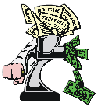INFORMATION ARTICLE

 |
How To Avoid Risk (by John D. Behle) |
|
The entire area of risk management is an extensive subject.
Little has been written other than by Lorelei Stevens in her
book "Lorelei's Legal Lessons." I sincerely believe
that no one should even consider paper investment without
reading her manual. It's that simple.
I looked at over 800 pages of my books and seminar
notebooks a while back and realized, that "strewn"
throughout were war stories and tips and techniques for risk
management that were valuable, but too disjointed. I decided
one of the most valuable contributions I can make to the
industry is to organize and share this material. I'll start
today and share monthly while I flesh out the material.
There are three main categories of risk. In The
Paper Game I termed them "The 3 P's of
Paper." They are: *The
People
*The
Paper
*The Property
I am going to start by addressing some of the common
"scams" and problem areas that seem to be causing
losses currently. I'll only have space to cover some of the
highlights. I'll look at some of the potential "profit
viruses" out there and some of the potential
"vaccines" to protect you. Some of the
"People" risks are: Fraud
The facts of life are that there are people that will lie,
cheat, steal and even kill to get ahead or to gain profit. You
are only safe in this business or almost any other by assuming
that people are out to get you. It's like riding a motorcycle
on the streets. I used to assume as long as I was on both
wheels, going the speed limit and not horsing around, I would
be fairly safe. When a little old lady tried to turn me into a
hood ornament, my viewpoint changed - as did the curvature of
my neck. Now, if I drive on the streets, I assume that
incredibly stupid maniacs are out to get me. I avert many
accidents by expecting the unexpected. You have to do the same
in business. Vaccine #1: Assume the potential for fraud. Do your "due diligence" no matter what. Don't succumb to the ease of accepting information someone else provides. Build a team of experts and resources to provide objective, independent verification of facts. It can be nearly impossible to "burn" you if you follow some of the simple and safe ways to verify details and information on a note. False
Documents
I have seen almost any document faked, altered or
falsified. You must verify everything. When I make the
statement that I buy "paper," I am referring to a
concept. I don't buy the documents that someone gives to me. I
"assume" they have been altered or falsified until I
prove otherwise. Simple verification phone calls or research
can make all the difference in the world. Vaccine #2: Verify all documents, facts and figures. Look at the potential consequences if a particular document were not correct, real or legitimate. False
Appraisals
I'm looking at an MAI appraisal right now from one
of the most respected appraisers in our area that I know has
been influenced in several ways (the appraisal has been
influenced, not him). The representations from the owner of
the property concerning zoning, development, potential
purchase offers and comparable sales have boosted the value.
On the other extreme, there are incompetent appraisers,
appraisers who will be bought or can be outright deceived. My
version of the "hood ornament" scenario in paper
investment came from a little old lady that presented me with
what I refer to as "appraisal du-jour." She had
taken an existing appraisal for the amount needed (on a
different property) and "whited out" the subject
property and typed in the one she wanted. If a gray-haired
grandmother is going to try that on me, I'll expect it from
anyone now. Vaccine #3: Suspect, verify or reject existing appraisals or appraisals ordered by anyone but yourself. If cost is a factor, existing appraisals can be reviewed by another appraiser for a cheaper cost than a new appraisal. False
Closing Documents
Some note buyers have put a lot of faith in closing
documents and sale prices in the past. These can be totally
irrelevant to today's values or even the value at the time of
closing. Fictitious documents can even make it look like a
note is in existence that never was real to begin with. Vaccine #4: Rely only on current values and verify the legal documents and recording through title reports and title insurance. In addition, I usually pull my own "abstract of title" which shows me the history of the title not just the current status. The abstract has prevented several fraud attempts in the past. Look for the "coherence" of the documents. Both the abstract and closing documents can give you clues as to the legitimacy of the transaction and whether the documentation matches the story and details given to you by the note seller. False
Payment History
I have seen payment histories where the ink was still wet
from being done up the night before (in the same pen and
handwriting). One came to me in Braille one time. Even when
they look legitimate, there is no way to verify a history of a
note that was not collected professionally. Vaccine
#5: Do
not rely heavily on payment histories. They can be faked
easily and a good payor can turn bad or sell his property
almost overnight. Rely on the property. It's the property that
will ultimately pay you in the end.
These are just a few areas to check into and protect
yourself against. There are many others related to the people
such as, False Title Reports or Insurance, False cushions
(false equity amounts that people try to create), Double
closing (multiple property sales to inflate value), Down
payment verification Representations (various other seller
representations, statements and warranties).
In addition to these, there are the "Paper" and
"Property" areas of risk and verification, that I
will cover in future articles.
About the Author . . . John holds an National Council of Exchangors "Gold
Card" and an EMS designation. He is also listed in Who's
Who In Creative Real Estate. John Behle is the author of
several hundred articles published in national magazines and
newsletters and of several ground-breaking real estate paper
books, including: * The Paper Game Trilogy |
|
![]() To
Fax this article to someone else for free click on the
box.
To
Fax this article to someone else for free click on the
box.
Home
Free Articles